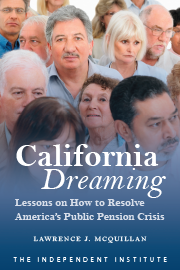Detroit’s Chapter 9 bankruptcy case is scheduled for trial beginning this Thursday, August 21, when U.S. Bankruptcy Court Judge Steven Rhodes will decide if the city’s restructuring plan is fair, legal and feasible.
Regardless of the outcome, precedents already have been set in the case that should have public employees elsewhere questioning the wisdom – and soundness – of their traditional “defined-benefit” pension plans.
Judge Rhodes already ruled, last December, that Detroit’s pension promises are not sacred in a bankruptcy proceeding: “The state constitutional provisions prohibiting the impairment of contracts and pensions impose no constraint on the bankruptcy process.”
Detroit has subsequently proposed a variety of such cuts to help resolve the estimated $18-20 billion in debt the city has accumulated.
Among those debts is nearly $2 billion in unfunded pension liabilities, owed to city retirees and employees vested in the General Retirement System. Rather than fully pay pensions for past work performed – the morally right thing to do – the city is offering to pay 95.5% of promised monthly pension benefits. The city also wants to eliminate the annual cost-of-living adjustment (COLA) and have some pensioners pay back millions of dollars in excessive interest received from 2003 through 2013.
Detroit police and firefighters, owed $1.25 billion for unfunded pensions, are being offered a slightly better deal: 100% of monthly pension benefits, with the annual COLA reduced from 2.25% to 1%.
Regardless of the final cuts imposed, the message is clear: promised city and county pension benefits are no longer sacrosanct, including those that are fully vested and supposedly guaranteed under state law.
What does this new reality mean? First, it means that more transparency is needed in public finance, both day-to-day and in those rare occasions when bankruptcy may be looming.
In the case of Detroit, taxpayers, creditors and current and former public employees should have insisted that all government-owned assets be considered during bankruptcy. This did not happen. Valuable city-owned assets, such as the Detroit Institute of Arts, whose collection was recently valued as high as $4.6 billion, were excluded from or not fully reflected in the bankruptcy balance sheet. Fairer recoveries for all creditors would result if all assets were on the table.
Under the Constitution’s Tenth Amendment, which limits the federal government’s power, federal bankruptcy judges cannot order a city or county to sell assets. But this prohibition doesn’t apply to local voters and government workers, who should have insisted that nonessential government assets be sold to pay for pension benefits already earned.
The Detroit experience also means that public employees, who routinely have lobbied for oversized pensions local governments can’t afford, need to realize that defined-benefit pensions may not be such a good deal after all. Defined-contribution pensions, such as the 401(k) or 403(b), where retirement benefits are not tied to the long-term financial health of a single business or local government, may be a better idea.
Under a defined-contribution pension, common in the private sector, the employer makes a regular contribution to the employee’s personal retirement account. The contribution typically is a fixed percentage of the worker’s salary.
Employees own and control these accounts, meaning that retirement benefits don’t depend on the future financial health of the local government.
Switching to reasonably priced defined-contribution plans would not only help employees, it would free up public funds to help finance unfunded liabilities accrued in the old pension plans. Or the funds could be spent on schools, police, hospitals, and other basic public services gutted by rising pension costs.
The next U.S. bankruptcy court to rule on public-employee pension cuts will likely be in Stockton, California, where Judge Christopher Klein is leaning toward allowing such cuts.
Though Detroit’s is the largest municipal bankruptcy in U.S. history, several cities – including Chicago, Los Angeles, and Philadelphia – also face pension woes that could lead to insolvency. The problem will not go away on its own.
Local-government employees and retirees should get in front of this spreading problem and adopt a strategy that keeps them from holding the bag. Selling nonessential government assets and switching to defined-contribution pensions would ensure that all earned benefits are paid and secure retirement systems exist in the future.









